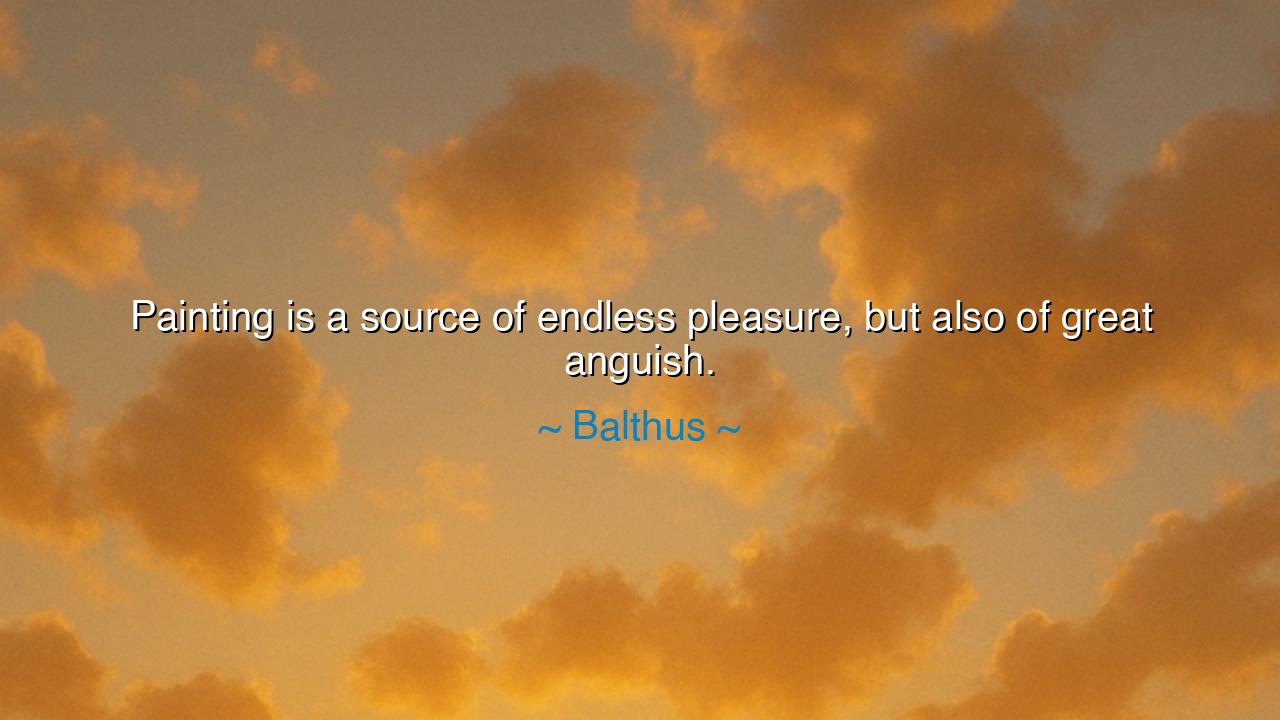
Painting is a source of endless pleasure, but also of great






“Painting is a source of endless pleasure, but also of great anguish.” Thus spoke Balthus, the enigmatic painter of shadows and stillness, whose works seem suspended between dream and memory. In this saying, he revealed the eternal paradox of creation — that the act which gives life to beauty is also the act which wounds the soul. For to create is to wrestle with the divine, to shape the invisible into form, to pour one’s very essence onto the canvas of existence. And in that struggle, the artist finds both ecstasy and suffering, both joy in discovery and torment in pursuit.
To understand this, one must see the artist not as a craftsman alone, but as a seeker — one who journeys beyond the visible world in search of truth. When Balthus speaks of endless pleasure, he refers to that sacred moment when color, light, and emotion converge; when the brush, guided by something greater than the hand, gives birth to meaning. It is the rapture of seeing one’s inner world take shape before one’s eyes, the pure intoxication of creation. Yet, with the same breath, he admits to great anguish, for the vision that burns within can never be captured fully by mortal means. The artist is condemned to chase perfection, knowing it forever escapes his grasp.
Such is the tragedy of all creators, ancient and modern alike. Michelangelo, when asked about his sculptures, said he merely freed the figures imprisoned within the marble — but every strike of his chisel was an act of both revelation and destruction. Each blow that brought the form to life also risked shattering it. The same agony haunted Van Gogh, whose heart burned so fiercely that his art consumed him. The joy of painting the golden fields of Arles came hand in hand with the torment of his own unraveling mind. In them, as in Balthus, we see that pleasure and anguish are not opposites, but companions in the soul’s creative journey.
Why is this so? Because art, at its deepest, is not merely about beauty — it is about truth. And truth, when glimpsed by mortal eyes, is both wondrous and terrible. To paint is to stand before that truth and hold its gaze, to confront the fleeting nature of time, the mystery of life, the ache of being human. The artist must pierce through illusion to reveal what lies beneath, and this piercing, though illuminating, is also painful. Thus, creation becomes an act of sacrifice — a surrender of peace in exchange for meaning. The brush becomes a blade that both heals and wounds.
And yet, the artist returns to the canvas, again and again. Why? Because even in anguish, there is purpose. For the act of creation redeems the suffering it causes. It allows the soul to touch eternity, if only for a moment. In this, the painter becomes like Prometheus, who stole fire from the gods to bring light to man — knowing he would be bound for it, yet daring all the same. Such is the nature of artistic courage: to embrace both the joy and the pain of creation, knowing that from this tension arises something immortal.
But the wisdom of Balthus’s words extends beyond painting alone. Every act of creation — be it a work of art, a relationship, a life’s calling — carries the same duality. To love deeply is to suffer deeply; to strive for greatness is to risk despair. The pleasure lies in the doing, the anguish in knowing it will never be perfect. Yet, without that anguish, there would be no growth, no refinement, no transcendence. The fire that burns also purifies. The pain that breaks the heart also enlarges it. Thus, to create is to live — fully, fiercely, and without retreat.
So, my children, take from Balthus’s confession not fear, but courage. If you would create — whether in art, in word, or in life — embrace both the pleasure and the anguish that come with it. Do not flee from the struggle; it is the proof that your work is alive, that your soul still burns. Know that every brushstroke of effort, every tear of frustration, is part of the masterpiece of your becoming. For in the end, it is not the finished painting that defines the artist — it is the will to return to the canvas, again and again, despite the anguish, in pursuit of that fleeting, eternal joy.
And so, let this be your lesson: creation is both burden and blessing, but it is through that very tension that humanity ascends. Endless pleasure, yes — for to make is divine. Great anguish, too — for to strive is human. To hold both in your heart and keep creating nonetheless — that is the mark of true greatness.






AAdministratorAdministrator
Welcome, honored guests. Please leave a comment, we will respond soon